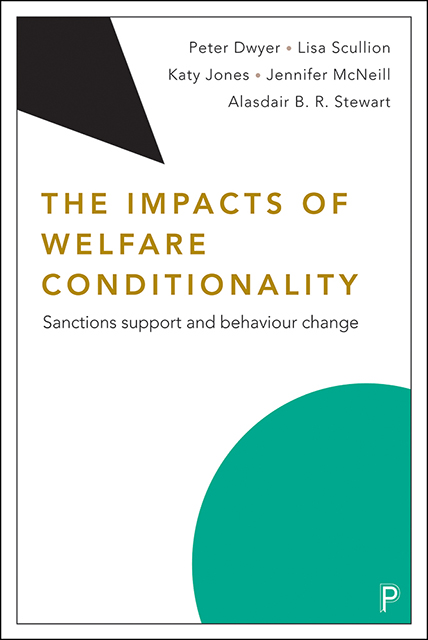Book contents
- Frontmatter
- Contents
- List of figures and tables
- List of abbreviations
- About the authors
- Acknowledgements
- One Introduction
- Two Conditionality in the UK welfare state
- Three Welfare conditionality and behaviour change
- Four From welfare to work? The effectiveness of welfare conditionality in moving people into paid employment
- Five Welfare conditionality and problematic or antisocial behaviour
- Six Unintended outcomes? The wider impacts of compulsion and benefit sanctions in social security
- Seven Ethical debates
- Eight Conclusions
- Methods appendix
- References
- Index
Four - From welfare to work? The effectiveness of welfare conditionality in moving people into paid employment
Published online by Cambridge University Press: 17 June 2023
- Frontmatter
- Contents
- List of figures and tables
- List of abbreviations
- About the authors
- Acknowledgements
- One Introduction
- Two Conditionality in the UK welfare state
- Three Welfare conditionality and behaviour change
- Four From welfare to work? The effectiveness of welfare conditionality in moving people into paid employment
- Five Welfare conditionality and problematic or antisocial behaviour
- Six Unintended outcomes? The wider impacts of compulsion and benefit sanctions in social security
- Seven Ethical debates
- Eight Conclusions
- Methods appendix
- References
- Index
Summary
A regularly repeated justification of welfare conditionality within social security systems is the claim that it is effective in moving people off social welfare benefits and into paid employment. Within the UK, the advent of ‘in-work’ conditionality within Universal Credit (UC), has further seen mandatory work search activity and benefit sanctions identified as appropriate tools for enhancing ‘progression’ within the paid labour market (PLM) and simultaneously reducing low-paid workers’ reliance on rent and wage subsidies via paid welfare and taxation systems (see Chapters Two and Three; Jones et al, 2019; Wright and Dwyer, 2022). Drawing on analysis of the qualitative longitudinal data generated by WelCond this chapter explores these claims. The first part of the chapter maps and highlights the differing work and welfare related trajectories and outcomes that ensued for the welfare service users (WSUs) who took part in repeat longitudinal interviews. However, the numerical mapping and typology offered facilitates only a partial and incomplete view of the ways that highly conditional social security systems impact on peoples’ pathways into, and out of, paid work. As Millar (2007: 537) notes, ‘quantitative data can map out trajectories … qualitative data can provide an understanding of what lies behind these’. Subsequent sections of the chapter, therefore, draw upon in-depth individual longitudinal case studies, presenting analysis that enables a more nuanced understanding of how, and why, welfare conditionality structures diverse work-related outcomes for different people, over time. On one level the individual case histories offered are illustrative of the wider patterns noted in the first part of the chapter. However, the detail and depth of these ‘condensed accounts’ enables a shift from ‘an illustrative case study towards the idea of an exploratory case history … [to] capture the essence of the interplay between agency and ecology, the particular and the general’ (Thomson, 2007: 57, 58).
As such they facilitate a deep and grounded understanding of the efficacy (or otherwise) of welfare conditionality in promoting and sustaining paid employment among social welfare benefit recipients.
- Type
- Chapter
- Information
- The Impacts of Welfare ConditionalitySanctions Support and Behaviour Change, pp. 68 - 93Publisher: Bristol University PressPrint publication year: 2022



